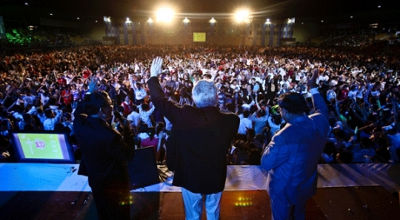Vietnam’s ‘Decree on Religion’ Clamps Down on Christianity
Method of Evaluation
The Vietnamese language Decree ND-92 reached me Nov. 9, the day after it was published. I have studied it carefully in the original language. In December I was able to ask well-placed government officials and a significant number of Protestant leaders about the new decree. A number of other religious groups, some Buddhist and Catholic organizations for example, have published their own analyses, which I have compared with my own findings.
What Does ND-92 Include, and Does It Advance Freedom?
The tone is set early. Chapter I is entitled “Freedom of religion and belief.” Article 2 contains 23 words that “guarantee” freedom of religion and belief. Those are followed by 142 words of conditions and warnings about its abuse. That’s a 6:1 ratio of warnings of abuse to promises of freedom.
Article 2 also promises “no one may infringe on a citizen’s freedom of religion.” The rest of the 24-page, 46-article decree infringes on that guarantee in even more intrusive ways than its 2005 predecessor.
And so it goes: one step forward, two steps back. ND-92 is designed to be more a tool for the management control of religion than a step toward religious freedom. The Party’s and the government’s deep suspicion of religion and religious people remains clearly on display. The updated decree appears to unmask the real purpose behind the 2004 ordinance: To manage, control and contain religious groups. The weight of abiding by this decree would be onerous for religious people and organizations, and this appears intentional.
Most relevant to Christian organizations are the six sections and 18 articles comprising Chapter III, entitled “Religious Organizations.”
Fundamental to understanding this chapter, and the entire decree, is the word dang ky, commonly translated as “registration” or “register.” In developed legal systems, if one meets well-known, clear and encoded written requirements, the law obligates the state to register, be it an organization or a car or a copyright.
By contrast, the dang ky registration in Vietnam’s handling of religion, including in ND-92, functions like having to ask permission. The evidence of this is that officials, usually at the commune level, have complete discretion on whether to grant registration. “Registration” therefore, is more accurately understood as “asking permission.” Many observers have not grasped or accepted this reality, thinking that registration in this context means meeting an objective requirement, or simply informing officials.
The reality is registration or permission is often conditional on elusive criteria which are open to highly subjective interpretation. This holds for permission for various levels of religious practice, such as for religious meetings, religious activities, or organizations seeking full legal recognition. It also holds for the approval of religious leaders in their official positions or location of service, and to students who wish to enter a religious vocation.
These elusive criteria are prominently spelled out in Articles 8 and 15 of the 2004 ordinance. Article 15 states:
“Religious activities or belief will be suspended in the following instances:
1. They infringe on national security, or seriously affect public order or the environment.
2. They adversely affect the peoples’ unity or the fine national cultural traditions.
3. They infringe upon the life, health, dignity, honor or property of other persons.
4. They involve other serious breaches of the law.”
What comes through clearly in these criteria is the government’s assumption that religious people are potentially dangerous people existing at the margins of legality and inclined toward anti-social behavior. The criteria readily provide excuses for officials to not give permission.
Consider the leader of a religious group seeking permission to conduct a meeting. Article 5 of Decree ND-92 requires the leader “to have a spirit of national unity and reconciliation.” Anyone who teaches the fundamental Christian tenet of worshipping God alone, and not ancestors or national heroes, is someone who could be accused of being against “national unity” or “the fine national cultural traditions.”
Article 6, stipulating qualifications for registering religious activities, says the group must have “doctrines, articles of faith, rites and ceremonies that support the nation and do not contradict fine traditions and customs.” This leaves much discretion to often hostile officials and state agencies with power to grant permission.
















































